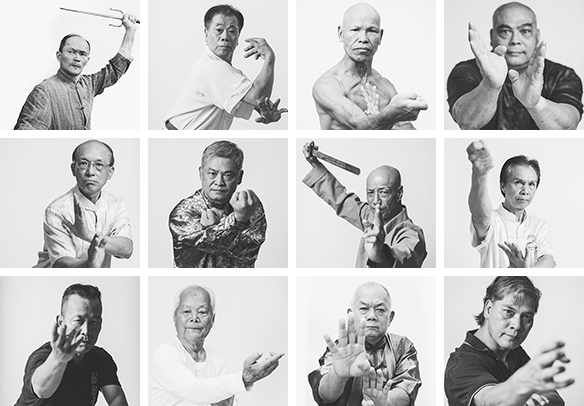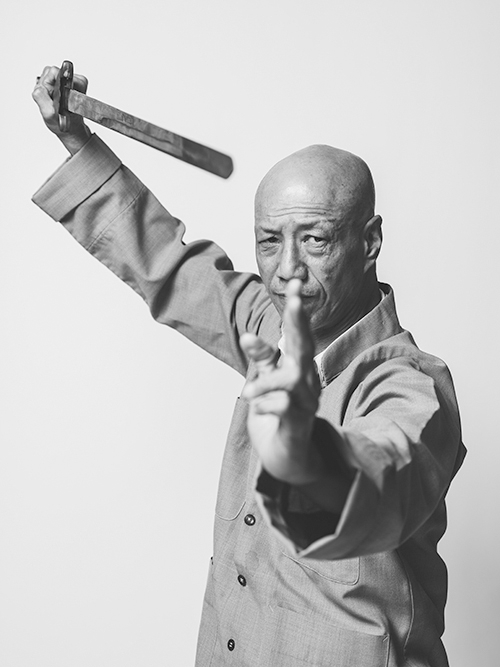Ip Chee Keung (childhood name: Pak Kun) was born in Hong Kong in 1949. His family came from Sinhui in Guangdong province. His father Ip Shui (deceased) was one of the most celebrated masters of Tung Kong Chow Ka Preying Mantis. Ip Chee Keung started studying martial arts when he was eight years old and began to take an earnest interest when he was fifteen. His father did not force but rather encouraged him on the path of kung fu, saying that mastery of one craft would enable him to support his family when he was older.
葉志強(乳名柏權),1949年香港出生,祖籍廣東新會,父親是東江周家螳螂拳葉瑞(已故)。由於家學淵源,葉志強從八歲開始跟隨父親習武,十五歲開始認真思考武術的真諦。父親葉瑞他採取引導性的方式,經常鼓勵他以後要有一門技藝養妻活兒!
After finishing secondary school Ip Chee Keung did not continue academic studies, but decided to seek work in society. In the 1960s Hong Kong’s economy was just starting to develop, and many aspects of its law and regulations, as well as social customs, were not yet mature, so it was not easy to find a secure job. Ip Chee Keung grew up in his father’s martial art school and saw that the disciples showed great respect towards his father, thus he thought about following in his father’s footsteps, which would enable him to gain respect while also making a living.
中學畢業後,葉志強沒有繼續升學,決定到社會謀生。1960年代的香港處於經濟發展初期,社會制度、法律及風氣仍有待改善,要找一份安穩的工作並不像現時容易。葉志強自小在武館生活,發現父親的徒弟態度恭敬,很尊敬父親,他考慮如像父親一樣當一名武術師傅,能得到別人尊敬之餘,又可以維持生活,就當時而言是不錯的職業。之後他留在父親的武館當助教,但要當一名全職教頭,需要更大量的訓練,提升身的功夫水平,因此他進一步提升訓練的質量,可以說這過程殿定了葉志強往後發揚東江周家螳螂拳的成就。
When Ip Chee Keung was twenty-one years of age, after having been assistant martial art instructor for over a year, he realized teaching martial arts was not as easy as he thought. To begin with, one’s income was limited by the number of students one could physically teach. In addition, there was fierce competition within the martial art community. He decided that teaching martial arts was unstable, and that even though he had gained mastery under his father’s tutelage, if he wanted to make a better living he had to seek a different path. It so happened that he got in touch with one of his father’s disciples who had migrated to the United Kingdom. The disciple suggested that he should move overseas also. From then on the idea of moving overseas was planted in his head. In the 1960s an immigration wave swept through the New Territories. During this period one of Ip Chee Keung’s elder martial art brothers moved to England and opened a Chinese restaurant. Through this connection he moved abroad to England in 1973.
當葉志強二十一歲時,同時當了一年多的武術助教,體驗到授武不是一件輕鬆的事情,首先收入受限於生員的數量,其次武術界的競爭漸趨激烈。葉志強認為授武營生不夠穩定,雖然已從父親身上習得高水平的功夫技藝,但如果想另創一番事業和謀求更高的回報,必須另辟道路。剛巧他父親移居英國的徒弟有聯系,建議他到外國發展,於是他萌生了到外國發展的苗頭。1960年代新界產生了一股移民潮,葉志強的這位師兄正好移民到英國並經營中餐館。因此他通過這層關係,結果最終他在1973年遠赴英國生活。
In the 1960s and 70s racial prejudice was rampant throughout the United Kingdom. Some scholars think that the United Kingdom’s favourable immigration policy to order to make up for labour shortage in the country was one of the contributing factors towards racial tension. During his stay in the United Kingdom Ip Chee Keung at first worked at his elder martial art brother’s restaurant, where he discovered some people regularly coming to the restaurant to eat without paying their bills. Recalling one particularly memorable incident, Ip Chee Keung said, “One time a group of British soldiers were at it again trying to get a “free meal”. At the same time they were insulting the Chinese and said that they wished to challenge Chinese kung fu. My boss asked me to resolve this problem. As my English was not very good I politely gestured that they should pay by using body language. But the soldiers’ attitude did not soften up at all, but instead threatened to use force. I had no choice but put up my guard. The soldiers were not only physically strong but also had some training in boxing, so I dared not take them lightly. As soon as one of them advanced I immediately sprang forward and pushed him away using the “daan” (“springing”) technique, which sent the soldier flying to the floor. A second soldier came forward and the same thing happened. After this they paid.”
然而上世紀六十至七十年代,有色人種在英國普遍受到當地人岐視。有學者認為是英國移民政策於從勞工短缺到勞工過剩,由此引發種族矛盾加劇。6 葉志強最初到師兄的餐館打工,發現常有外國人「吃霸王餐」(不付款)的現象。終於有一次有幾位英國士兵想吃「霸王餐」,還說明要挑戰中國功夫。回憶當年的場景,葉志強說:「老闆請我幫忙解決問題。我先禮後兵,但由於英語不太流利,用肢體語言要求他們結帳,但士兵態度強硬,勢要動武。只好擺好樁(預備姿勢)嚴陣以待。士兵們不但身體素質好而且都習過西洋拳,我也不敢放鬆,候方一靠近,馬上出手『彈』在方身上,那人被勁力彈『飛』(撞倒地上),第二個士兵再試,結果一樣,最後當然付錢了事了。」
Through this incident the restaurant owner came to know that Ip Chee Keung was a kung fu master, and asked him to teach his staff martial arts for self-protection. At first, he only taught a handful of Chinese around midnight after the restaurant closed, but later some non-Chinese joined the class. After several months Ip Chee Keung had gathered a good number of students. In 1974 he decided to rent a place to teach kung fu full-time, and started to travel to Hungary to teach martial arts, and in this way Tung Kong Chow Ka Preying Mantis started to develop in Europe. After a few years the kung fu heat wave in the United Kingdom started to cool. In the beginning of 1979 as Ip Shui was getting old, Ip Chee Keung decided to return to Hong Kong to look after his father and take care of the martial art school. But the number of students continued to fall. His father lacked the energy to teach and chose to focus on tit daa practice. Ip Chee Keung, on the other hand, was not interested in running a tit daa clinic and so he became a full-time driver, while keeping up his kung fu practice every morning and evening.
葉志強無意中表現了高超的身手,餐館老闆更要求他教員工們功夫防身。當時由晚上十二時關店後才開始教,最初只教幾位華人,後來也教外國人,過了幾個月學員多了。1974年,他決定租一個地方全職教功夫,也曾到匈牙利教拳,東江周家螳螂拳開始在歐洲發展起來。但過了幾年,英國的功夫熱潮像李小龍電影般冷卻了。1979年初,由於葉瑞的年紀漸長,葉志強決定回港照顧父親及打理武館,但是當時學員愈來愈少了,父親提不起勁教功夫,主要經營跌打醫務。葉志強對經營跌打沒有興趣,因此外出工作,當全職司機。他在工作之餘,保持每天早晚習武。
In 1990 an overseas student called him and asked him to return to the United Kingdom to teach, explaining that Chinese martial arts were becoming popular once again. By then Ip Chee Keung was already married and had his own family in Hong Kong, and so it was not possible for him to go back to the United Kingdom to teach, but he promised to return to the United Kingdom to survey the situation. Returning to the United Kingdom, he saw that many of his students had opened their own martial art schools and that he had a large number of “grand students” who greeted him warmly. From then on he spent a portion of his time every year to teach overseas. This has been ongoing for the last twenty years.
到了1990年,突然有位外國徒弟給他打電話聯絡,請求他回英國教功夫,解釋英國的功夫熱潮再次興起了。8當時葉志強已在香港成家立室,不便再到英國授武,但他答應到英國視察。這次故地重遊,讓他知道不少徒弟已經開設武館獨當一面,並且大批徒孫熱情地歡迎師公。自此,他保持每年利用一段時間到外國教武,一晃已經二十載。
Ip Chee Keung keeps his father’s teachings and exhortations to his heart. Like his father, he wishes more people would know Tung Kong Chow Ka Preying Mantis, and emphasizes the need to grasp the basics, to develop true skills and deep knowledge rather than constantly seeking for variety and quantity. He explains that the basics in kung fu, and in particular having a solid stance, is like a building’s foundation, or the roots of a big tree. If one’s stance is not solid as soon as you cross arms with an opponent you fall to the ground. That is why there is a saying “stance practice accompanies you through your life, unless you choose not to learn kung fu”.
葉志強常常惦念父親的語重心長及鼓勵,希望更多人認識東江周家螳螂拳的功夫,他常強調基本功的重要性,學功夫不追求技多,套路多。他解釋練功夫馬步要穩,就像建高樓大廈的地基,又如大樹要落地生根。馬步不夠穩,一跟別人交手,一經碰撞就倒地了,就是常言「要行一世馬,除非不學功夫」。





